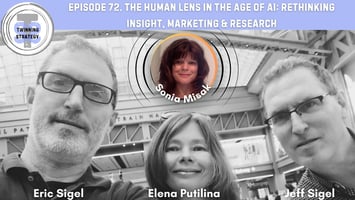In this week's Episode of the Twinning Strategy Podcast with Ryan Castillo, co-founder of Knowatoa,...
Health and Well-being in the Era of AI
In this week's episode of the Twinning Strategy podcast, industry expert Paulo Machado sheds light on the transformative potential of AI in enhancing well-being and health. He kicks things off with a reminder of the enormity of change AI is bringing into the healthcare landscape. While some may overestimate its immediate capabilities, implying that we should expect miracles overnight, Paulo estimates that we are likely to see significant advancements in the next five years. This expectation ties into a broader understanding that technology is increasingly replacing cognitive tasks traditionally performed by humans, much like how early robotics revolutionized physical labor.
Paulo draws a parallel to World War II, indicating that the U.S. is pouring an unprecedented amount of capital and intellectual resources into AI—perhaps more than any technological shift we've seen in living memory. This collective investment is not merely a reflection of hype; it acknowledges the myriad second and third-order consequences that AI could have on our health and daily workflows.
In discussing well-being, Paulo emphasizes that it is no longer a connotation of mere physical health but a much richer component of human flourishing. The discussion moves toward personal and societal definitions of well-being, with a spotlight on how AI could either facilitate this growth or exacerbate existing disparities. The dialogue further traverses through what it means to be human in an ever-evolving landscape where AI might assume many tasks. As he mentions, this substantial shift could prompt us to reevaluate our definitions of purpose and productivity. The risk lies in a cultural inertia—a tendency to cling to traditional metrics of success, like material wealth or corporate achievement, which often minimizes diverse pathways to well-being.
Ultimately, the conversation highlights the importance of cultivating emotional intelligence within AI frameworks. The integration of empathic systems could foster altruistic interactions and beneficial outcomes, guiding society toward collective well-being and flourishing rather than individualistic pursuits. This kind of nuanced view is essential, especially considering that our societal frameworks should holistically embrace this technological revolution, rather than allow a few to monopolize the benefits.
Moving forward, it's vital that we engage in conscious conversations about these topics, involving varied perspectives from technology, psychology, and ethics. After all, as we stand on the precipice of such rapid change, the dialogue must heed the lessons of history while aspiring for a more equitable, harmonious future.
Deep discussions about the intersection of technology and humanity are more relevant now than ever. As Paulo suggests, we should be proactive about shaping the narrative around AI benefits and impacts on society. Engaging with these topics is not optional; it is a necessity for the evolution of a supportive, thriving community built around shared values and an unwavering commitment to flourish together.
#AI #HealthTech #Wellbeing #Innovation #FutureOfWork #DigitalTransformation #EmotionalIntelligence #CollectiveFlourishing #TechnologyForGood #Mentorship #HumanExperience #EmpathyInAI



